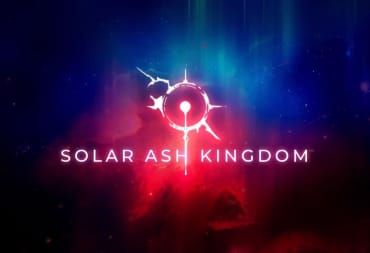There are some developers who remain steadfastly in their comfort zones throughout their careers. Heart Machine cannot be said to be one of them. After 2016's Hyper Light Drifter used Zelda-style top-down action to examine lead dev Alx Preston's heart condition, the studio's new game Solar Ash is a leap forward in terms of ambition. It's best described as a "skating platformer"; it plays like a combination of 3D Sonic the Hedgehog, Jet Set Radio, and Shadow of the Colossus. If nothing else, Preston and his team can be commended for the scope of their reach.
In Solar Ash, you are Rei, a Voidrunner whose planet has been pulled into a reality-warping vortex. It's up to you to discover what's happened to your planet and its inhabitants, as well as find a way to save it. To do so, you must traverse a beautiful world with a neon aesthetic similar to that of Hyper Light Drifter, skating through semi-linear 3D platforming challenges and navigating a series of Hyrule Field-esque open-world environments. From the off, Heart Machine's game oozes ambition and scope, but whether or not it sticks its landing is another matter altogether.
Solar Ash Likes To Move It

At its core, Solar Ash is a game about movement. Maintaining momentum as you glide through its sequence of obstacles and challenges is your raison d'etre. Heart Machine's game is spread across multiple open environments, each containing climbing challenges that culminate in an ominous-looking eye you must destroy. In this way, Solar Ash is similar to the 2008 Prince of Persia reboot. You scan your environment, pick a direction, and skate, grinding across rails and leaping over chasms in order to reach your objective.
You're essentially attempting to put together the best figure skating routine your invisible judges have ever seen.
At its best, the movement in Solar Ash is dizzyingly satisfying. If you can maintain your speed and focus, there's a balletic grace to the platforming that never gets old. When the stars align and you're able to chain rail grinds, double jumps, and grapples, Solar Ash really feels like it comes together as an experience. There are enemies to fight along the way, but for the most part, they're just one more obstacle; you're essentially attempting to put together the best figure skating routine your invisible judges have ever seen. When it works, it's glorious.
This sense of freedom extends to the boss battles, which are clever and compelling, if a little repetitive. At the end of each "world", you'll face off against a giant monster, Shadow of the Colossus-style. First, you'll need to grapple onto it. After this, you'll have to complete a high-stakes platforming challenge during which you'll need to show off the true extent of your mastery over the controls. In practice, these sequences are essentially the same as the ones you've been going through during the levels. The bosses are constantly in motion, though, giving these fights an urgency and scale that Solar Ash otherwise lacks. They're easily the highlight of the game.
There's No Reason For Solar Ash To Have An Open World

Unfortunately, when moving outside the core gameplay, things fall down a little. Once you find a "level", you'll quickly understand the joy in Solar Ash's core mechanics, but exploring its semi-open environments is a drag. There's very little to find by traveling off the beaten path. While you can uncover caches of resources, there's very little to spend those resources on beyond temporary shield upgrades. These feel a little pointless given the low stakes for failure; you're usually deposited back at your last checkpoint to try again, so taking damage or dying during a challenge doesn't feel particularly punishing. As such, gathering resources for more health feels redundant.
Of course, you can also uncover audio logs and text documents detailing the backstory of Solar Ash's world as you explore. The world Heart Machine has created is beautiful and breathtaking, so it's baffling and disappointing that the environments aren't allowed to tell stories in and of themselves. Instead, the narrative is relegated to boring, drab lore dumps that never feel involving or engaging. It's hard to empathize with Solar Ash's characters when they're rarely more than words or voices, and their stories don't feel particularly compelling either. All of this adds up to mean that finding lore nuggets as collectibles isn't particularly interesting.
Outside minor suit upgrades, there isn't any way to augment or improve Rei's abilities, either. You'll be using the same movement mechanics throughout Solar Ash, which means that by the third or fourth world, you'll likely start to get a little bored. Adding an air dash, a glide, or any number of other extra abilities could have helped break the monotony up a little and augment the levels-as-puzzles design, but as it is, you've seen everything Solar Ash has to offer gameplay-wise within the first couple of hours. It's safe to say the massive potential on display in the core gameplay loop hasn't been fully realized here.
Solar Ash Has A Tedious Story

Across the board, the storytelling in Solar Ash is pretty poor. While Rei's story is initially compelling, leading you to explore her shattered planet and learn about its inhabitants, you'll quickly realize there's not much here to anchor yourself to. Solar Ash falls back on the tried-and-true method of dialogue trees during conversations, none of which are particularly well-written or interesting to sit through. They're all peppered with lore fragments and concepts that are never given room to breathe or explain themselves properly, turning conversations into slogs as you wait impatiently for the next gameplay sequence to begin.
The mundanity of the voice acting undermines any drama or peril the narrative might have had
Given how many dialogue sequences there are in Solar Ash and how often Rei talks to herself, the voice acting isn't up to scratch either. The alien aesthetics and reality-shattering nature of the world clash heavily against the mundane way in which the voice lines are delivered. The voice actors don't sound like they're on an alien planet, nor do they bring across the requisite amount of emotion when they're voicing an audio log in which the character is going through significant trauma. Either Solar Ash should have gone for a Zelda-style language made up of nonsense syllables, or it should have omitted its voice acting entirely.
This problem reveals itself most when Rei is squaring up against Echo, the giant alien who serves as the ostensible antagonist for most of Solar Ash. Echo's design is impressive; she's a giant being of pure light pierced by a needle-like spear. When she converses with Rei, though, they sound like two coworkers who have fallen out over who gets to use the water cooler. The mundanity of the voice acting undermines any drama or peril the narrative might have had and makes Solar Ash feel like a jarringly low-stakes proposition.
Solar Ash Undermines Its Own Gameplay

Throughout Solar Ash, there's a sense that Heart Machine is almost ashamed of the gameplay loop it's created. Momentum is the name of the game, but all too often, you're brought to a juddering halt by one or other of the ancillary mechanics. Dialogue trees and text logs stop you in your tracks. Climbing walls requires you to faceplant into a pool of slime and slowly inch your way upwards. Sometimes, the controls themselves simply don't respond as they should, leading to a sudden stop in a platforming sequence. When movement is as satisfying as it is in Solar Ash, these frequent roadblocks are inordinately frustrating.
There's a general lack of consideration for how narrative interacts with gameplay, too. Since gameplay never evolves in any meaningful way (barring the occasional introduction of pointless puzzle elements), it's left to dialogue, text logs, and cutscenes to impart the narrative. The gameplay is never used in any clever way to help tell the story, nor is it subverted for emotional purposes. You find a new area, skate-platform for a bit, then get some story. Rinse and repeat. In this way, Solar Ash feels like a game of two halves, and one of them is significantly more compelling than the other.
Solar Ash | Final Thoughts

I wanted to like Solar Ash a lot more than I did. The platforming gameplay is frequently brilliant, even if it's not always executed as well as the concept deserves. Leaping and bounding across the game's expansive, beautiful environments often feels great, but there's just nothing in those environments to find. There's also a terminal lack of iteration or evolution to the gameplay; you have all the skills you'll need from the outset, and the obstacle playgrounds you'll tackle throughout Solar Ash never evolve or change in any meaningful sense. There was potential here, but Solar Ash burns out before it gets the chance to shine.
TechRaptor reviewed Solar Ash on PC via the Epic Games Store using a code provided by the developer. The game is also available on PlayStation 4 and PlayStation 5.
Review Summary
Pros
- Excellent Platforming
- Maintaining Momentum Feels Great
- Beautiful Environments
Cons
- Flat Open World
- Story Lacks Weight
- Gets Repetitive
- Gameplay And Story Feel At Odds
Have a tip, or want to point out something we missed? Leave a Comment or e-mail us at tips@techraptor.net









